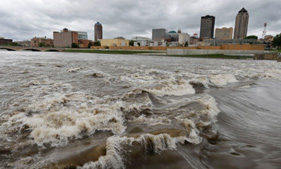Climate change fears rise – tourism dangers apparent

Not only have insurers now said that climate change should be taken into account but also new US report gives yet another dire warning
Climate change’s assorted harms are expected to become increasingly disruptive across the US throughout this century and beyond, the National Climate Assessment has concluded.
Climate change has moved from the corners of the earth into the American backyard, the country’s leading scientists warned on Tuesday, releasing a landmark report they hoped would spur action on climate change.
The 840-page National Climate Assessment was seen as the definitive account of the effects of climate change on America, and of the country’s efforts to deal with climate change.
The findings were immediately embraced by the White House as "actionable science" which would guide Barack Obama as he moves to cut carbon emissions from power plants next month and for the remaining two years of his presidency.
"I think this National Climate Assessment is the loudest and clearest alarm bell to date signalling the need to take urgent action to combat the threats to Americans from climate change," John Holdren, the White House science advisor, told a conference call with reporters.
Scientists who worked on the report said its main messsage was that climate change was already disrupting the lives of Americans – now and in real-time – and was doing so much more strongly than scientists had expected.
Climate change was already registering in the form of extreme weather, sea-level rise, and the thawing of Arctic sea ice, a shift in growing seasons, and other indicators, the report said.
Sea-level rise, which could reach 4ft by the end of the century, was already causing dangerous flooding in low-lying (and touristic) areas like Miami, Norfolk, Virginia, and Portsmouth, New Hampshire, the report said. Florida alone could face a $130 billion bill for flooding damage by the year 2100.
Drought and high temperatures were already baking California and Arizona and prolonging the fire season in other parts of the south-west.
In California, warmer winters have made it difficult to grow cherries. In the midwest, wetter springs have delayed planting. Invasive vines such as kudzu have spread northward, from the south to the Canadian border.
Environmental groups and Democratic members of Congress also rallied to support the report.
John Podesta, the White House counsellor, said Obama would rely on the report’s findings as he moves ahead on the most ambitious phase of his climate change plan in June – a proposal to cut emissions from the current generation of power plants, responsible for nearly 40% of US carbon dioxide emissions.
Meanwhile, a leading coal industry lobby group, the American Coalition for Clean Coal Electricity, dismissed the report as "unsubstantiated scare tactics and hyperbole" and lashed out at Obama for moving ahead on power plant regulations.
Meanwhile, in the UK, in the wake of another climate change report ‘Climate Change and Security’, the world’s oldest and biggest insurance market, Lloyd’s of London said: "Climate change will undoubtedly have major economic and business implications worldwide, so Lloyd’s 360° Risk Insight and the International Institute of Strategic Studies (IISS) have joined forces to explore the issues from a business perspective."
"Competition for resources and nations becoming more protective over assets are likely to be among the changes as climate change takes hold. But it’s not all bad news. Business opportunities are likely to emerge, ranging from energy efficiency and water conservation to security."
Download Climate Change and Security HERE
Valere Tjolle
This week’s Vision special FREE offer HERE
 United Kingdom
United Kingdom United States
United States Asia Pacific
Asia Pacific












































Dozens fall ill in P&O Cruises ship outbreak
Turkish Airlines flight in emergency landing after pilot dies
Boy falls to death on cruise ship
Unexpected wave rocks cruise ship
Woman dies after going overboard in English Channel